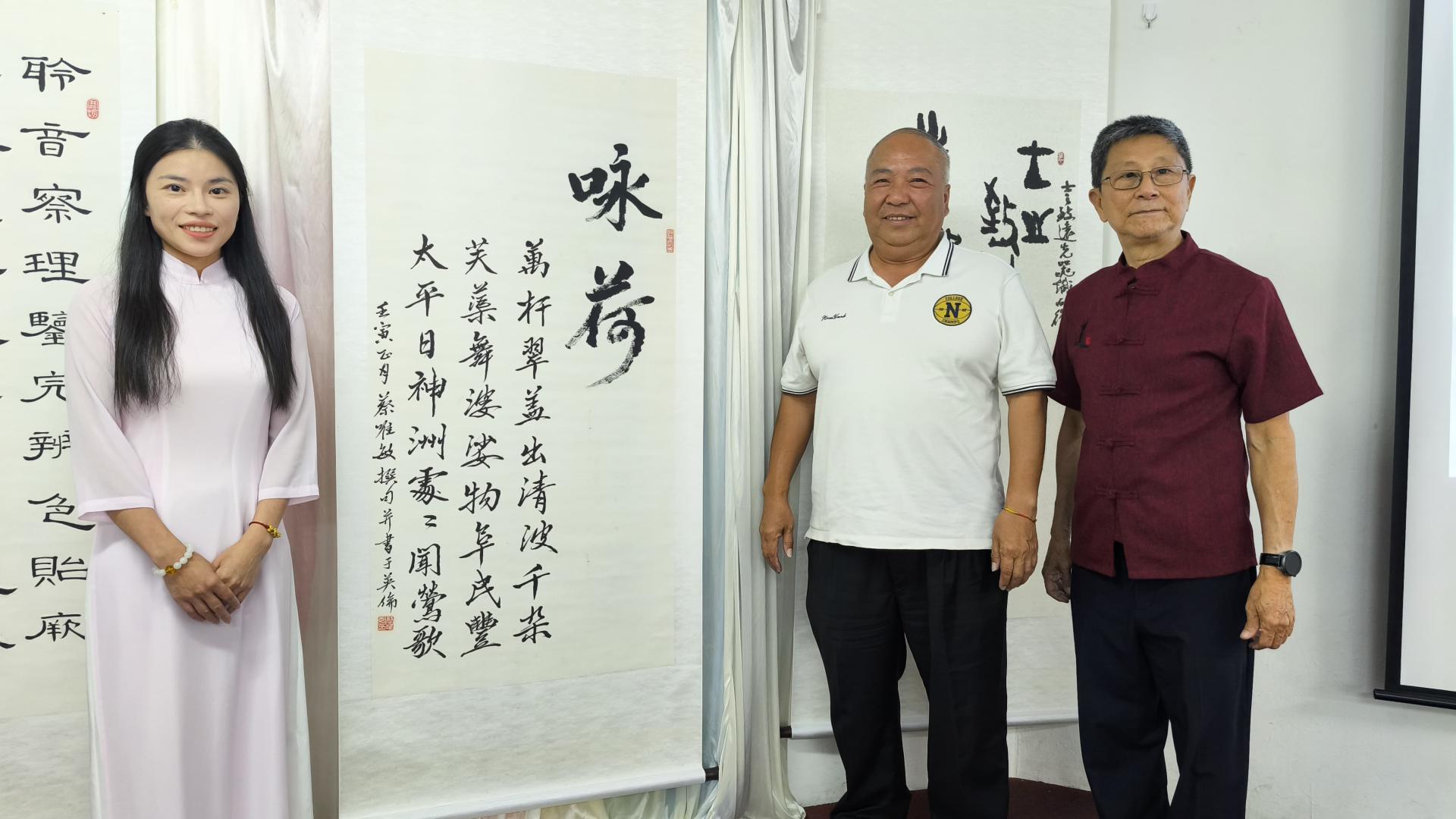(Sibu, 26th) The "Culture Classroom" course continues to be held. In addition to explaining the knowledge of Chinese characters and history, it also introduces various methods of divination from the Book of Changes (Zhou Yi). The instructor demonstrated the process of coin divination and staves divination, giving students a glimpse into ancient wisdom and allowing them to experience the fun of using divination to resolve doubt.
The course was taught by Mr. Shen Renxiang. Content covers the origins and evolution of characters such as oracle bone script and small seal script, and explains the origins, evolution, and related word systems of radicals like “人” (person) and “口” (mouth), enabling students to understand the development of Chinese characters from the structure.
For example, the “人” (person) radical gives rise to derivatives such as 从 (follow), 众 (crowd), 仁 (benevolence), 仿 (imitate), 付 (pay), 伐 (attack), 信 (trust), 使 (make/use), 侍 (attend), 伺 (wait/spy), 仕 (official), 仇 (enemy), 儒 (Confucian), etc., covering areas like behaviors, states, professions, and ethics; while the “口” (mouth) radical extends to characters like 舌 (tongue), 言 (speech), 甘 (sweet), 品 (article/product), 曰 (say), etc., all related to language, expression, or organs.
The class began with monitor Shen Zongxiang hosting the "Chinese Characters in the Hearts of Students" session, where each participant shared a character and its meaning, deepening their emotional connection with the script.
The "Classics Reading" session was led by Ms. Hu Ting, who recited Song dynasty poet Li Zhiyi's "Busuanzhi" (Diviner's Song), explaining the background of the ci form and its artistic beauty, helping students experience literary rhythm and philosophical reflection in chanting.
On the topic of cultural knowledge, Mr. Zhang Yongfa explained the theory of Zhou Yi divination, including the principles and steps of yarrow stalk divination, and emphasized the "Three No-Divinations" principle: do not divine without sincerity, do not divine for unrighteous purposes, and do not divine without doubt. The lesson clarified that the purpose of divination is not to predict the future, but to "resolve doubt"—helping people size up the situation and make judgments at critical moments.
The teacher further emphasized: “Divination cannot replace human rationality, and it must not become an excuse for shirking responsibility. If one’s behavior lacks virtue, even a favorable divination result is meaningless.”
The course also compared the differences between the Pre-Heaven (Xiantian) and Post-Heaven (Houtian) Eight Trigrams, noting that the former emphasizes the natural order of the universe, while the latter reflects the interaction of time and space in human society, serving as an important tool for understanding the universe and life.
To deepen hands-on experience, Mr. Zhang Yongfa demonstrated coin divination on site, and students also tried it personally under guidance, using three coins to complete the divination. The process was easy and enjoyable, creating a lively classroom atmosphere.
The lecture content was both profound and accessible, balancing knowledge, philosophy, and fun. It not only broadened students’ horizons but also bridged the wisdom of ancient culture and modern life, receiving unanimous praise.
For example, the “人” (person) radical gives rise to derivatives such as 从 (follow), 众 (crowd), 仁 (benevolence), 仿 (imitate), 付 (pay), 伐 (attack), 信 (trust), 使 (make/use), 侍 (attend), 伺 (wait/spy), 仕 (official), 仇 (enemy), 儒 (Confucian), etc., covering areas like behaviors, states, professions, and ethics; while the “口” (mouth) radical extends to characters like 舌 (tongue), 言 (speech), 甘 (sweet), 品 (article/product), 曰 (say), etc., all related to language, expression, or organs.
The class began with monitor Shen Zongxiang hosting the "Chinese Characters in the Hearts of Students" session, where each participant shared a character and its meaning, deepening their emotional connection with the script.
The "Classics Reading" session was led by Ms. Hu Ting, who recited Song dynasty poet Li Zhiyi's "Busuanzhi" (Diviner's Song), explaining the background of the ci form and its artistic beauty, helping students experience literary rhythm and philosophical reflection in chanting.
On the topic of cultural knowledge, Mr. Zhang Yongfa explained the theory of Zhou Yi divination, including the principles and steps of yarrow stalk divination, and emphasized the "Three No-Divinations" principle: do not divine without sincerity, do not divine for unrighteous purposes, and do not divine without doubt. The lesson clarified that the purpose of divination is not to predict the future, but to "resolve doubt"—helping people size up the situation and make judgments at critical moments.
The teacher further emphasized: “Divination cannot replace human rationality, and it must not become an excuse for shirking responsibility. If one’s behavior lacks virtue, even a favorable divination result is meaningless.”
The course also compared the differences between the Pre-Heaven (Xiantian) and Post-Heaven (Houtian) Eight Trigrams, noting that the former emphasizes the natural order of the universe, while the latter reflects the interaction of time and space in human society, serving as an important tool for understanding the universe and life.
To deepen hands-on experience, Mr. Zhang Yongfa demonstrated coin divination on site, and students also tried it personally under guidance, using three coins to complete the divination. The process was easy and enjoyable, creating a lively classroom atmosphere.
The lecture content was both profound and accessible, balancing knowledge, philosophy, and fun. It not only broadened students’ horizons but also bridged the wisdom of ancient culture and modern life, receiving unanimous praise.
